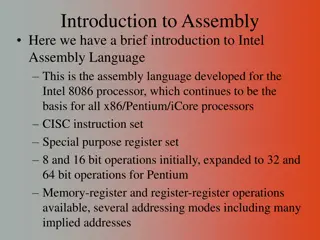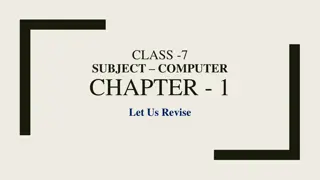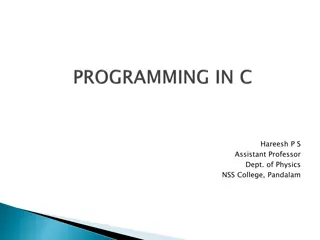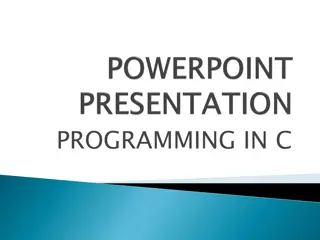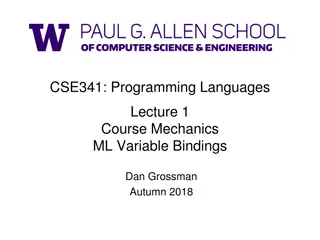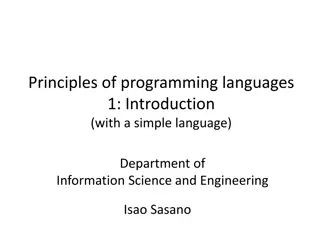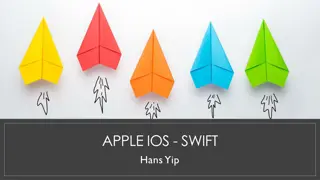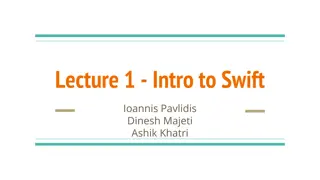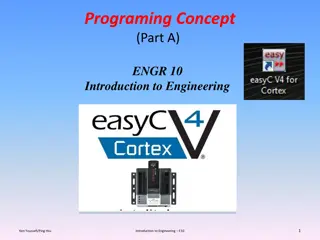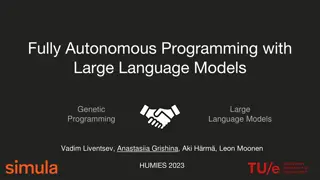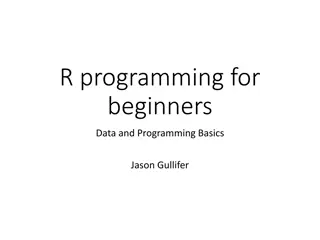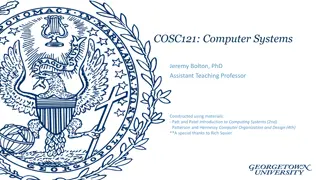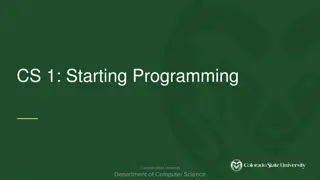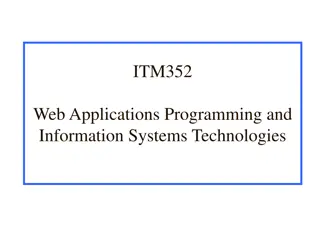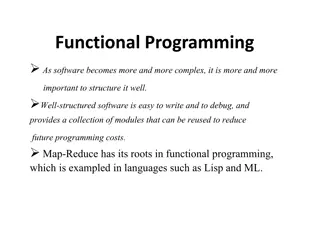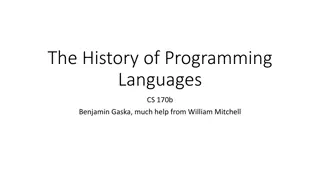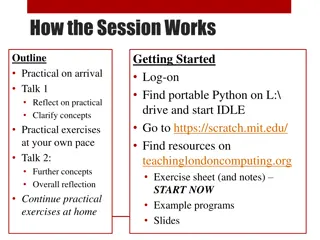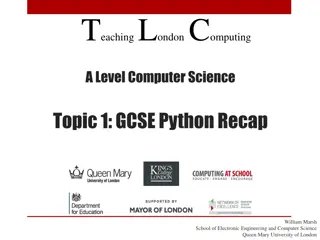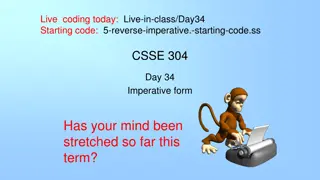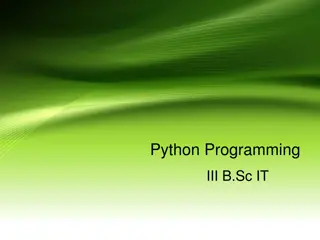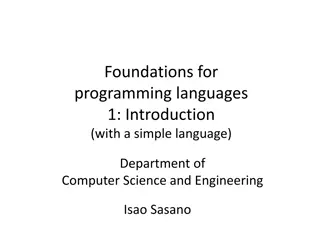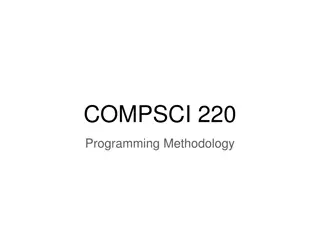Understanding Translation: Key Concepts and Definitions
Translation involves transferring written text from one language to another, while interpreting deals with oral communication. Etymologically, the term "translation" comes from Latin meaning "to carry over." It is a process of replacing an original text with another in a different language. Translat
12 views • 76 slides
Programming in C: Overview and Constants Explanation
Programming in C is a fundamental introductory guide to the C programming language. It covers the basics of C, including its development history, character set, constants, and rules for constructing constants like integer and real constants. Dr. M. A. JAMAL MOHAMED YASEEN ZUBEIR, an Assistant Profes
4 views • 33 slides
Decision Analysis and Operations Research in Management
This content delves into Management Decision Analysis and Operations Research techniques such as Linear Programming, Integer Linear Programming, Dynamic Programming, Nonlinear Programming, and Network Programming. It covers the phases of an Operations Research study, mathematical modeling for decisi
0 views • 36 slides
Introduction to Intel Assembly Language for x86 Processors
Intel Assembly Language is a low-level programming language designed for Intel 8086 processors and their successors. It features a CISC instruction set, special purpose registers, memory-register operations, and various addressing modes. The language employs mnemonics to represent instructions, with
2 views • 12 slides
Module 2: PSEA and Safe Programming Training of Trainers (ToT) by CRS HRD
This Module 2 focuses on PSEA and Safe Programming, covering key sessions on understanding safe programming, identifying protection and SEA risks, and mitigating risks. It emphasizes the importance of safe programming in increasing safety, dignity, and access, with staff playing a crucial role. Part
3 views • 19 slides
Understanding Computer Programming: Basics and Beyond
In this chapter, we delve into the fundamental concepts of computer programming. We explore the definition of a program, the role of programming languages, types of programming languages, and generations of programming languages. Additionally, an assignment is provided to reinforce the key learnings
0 views • 25 slides
Understanding Object-Oriented Programming (OOP) in Python
Python is a versatile programming language that supports various programming approaches. Object-Oriented Programming (OOP) is a popular method in Python where objects are created to solve programming problems. OOP in Python focuses on creating reusable code, following the principle of DRY (Don't Rep
2 views • 35 slides
Understanding Programming Languages: Levels and Basics
Programming languages facilitate communication between humans and computers, with machine language being the fundamental binary code understood by computers. Different levels of programming languages exist, from low-level machine language to high-level languages like C. Natural languages are meant f
0 views • 35 slides
Introduction to Computers and C++ Programming Lecture 1 - Overview and Basics
This lecture covers the fundamental concepts in computer systems and programming using C++. Topics include the main components of a computer, bytes and addresses in memory, computer systems hardware and software, understanding programs, programming languages, compilers, preparing and running C++ pro
1 views • 21 slides
Introduction to Programming in C Language
C language is a procedural programming language developed by Dennis Ritchie in 1972. Known for its low-level access to memory, simple keyword set, and clean style, C is ideal for system programming tasks like operating system and compiler development. This article covers key aspects of C language, P
0 views • 12 slides
Autumn 2018 CSE341 Programming Languages Course Overview
Welcome to the Autumn 2018 CSE341 course on Programming Languages! Join us for a comprehensive 10-week journey to grasp the core concepts that underlie all programming languages. Dive into ML, Racket, and Ruby while honing your programming skills through homework assignments. Engage with the course
1 views • 32 slides
Principles of Programming Languages: Introduction and Machine Language Overview
This material covers the basics of programming languages, including an introduction to a simple language, evaluation methods, and contact information for the instructor. It explains machine language, the native language of computers, and the transition to high-level programming languages. The benefi
0 views • 24 slides
Web Application Development and Programming CTE Program Overview
Viera High School offers a comprehensive CTE program in Web Application Development and Programming, taught by Mr. Dohmen. Students learn popular programming languages like Python, SQL, JavaScript, Java, C#, and C. The courses cover web programming, JavaScripting, and PHP programming, providing cert
2 views • 7 slides
Introduction to Programming with RobotC in Robotics Education
Programming in robotics involves giving specific directions to a robot using software like RobotC. This introduction covers the basics of programming, software organization, and how to get started with RobotC through creating flow charts and programming tasks. Learn about setting up RobotC, creating
1 views • 8 slides
Introduction to Programming and Computer Instructions
Programming is the process of creating instructions for computers to follow and accomplish tasks. It involves turning human language instructions into detailed binary machine language. Before learning programming, individuals may have different levels of experience, ranging from no experience to pro
0 views • 16 slides
Exploring Swift: A Modern & Powerful Programming Language
Swift is a powerful and intuitive programming language designed for macOS, iOS, watchOS, and tvOS. It offers a concise yet expressive syntax with modern features that developers love. The language focuses on safety, speed, and ease of use, making it ideal for a wide range of applications from system
0 views • 7 slides
Introduction to Swift Programming Language
Swift is a modern programming language known for its evolution and development since 2010. It is a general-purpose, compiled language that supports both object-oriented and functional programming paradigms. Key features include constants, variables, operators, strings, optionals, and control flows l
0 views • 19 slides
Development of Attosecond Theory for Nobel Prize through Verilog Programming
Attosecond generation is a crucial technique for creating attosecond pulses by manipulating radiation waves. This research paper focuses on developing the Attosecond generation equation through Verilog programming and validating it using test programming techniques. The interface between equations,
2 views • 15 slides
Introduction to Computer Programming in Engineering
Computer programming in engineering involves breaking down tasks into small steps to instruct a computer. This process requires understanding programming languages such as C, C++, and Java, and concepts like Object-Oriented Programming (OOP). The sequential execution of expressions and the importanc
0 views • 36 slides
Fully Autonomous Programming: Advancing Software Development Through AI
Explore the concept of fully autonomous programming using large language models and genetic programming, aimed at enabling more individuals to create software products with a focus on creativity and rapid prototyping. The proposed framework involves synthesizing, executing, instructing, debugging, a
0 views • 11 slides
CS252 Systems Programming Course Overview
This course overview covers topics such as C programming review, Unix basics, Unix systems programming, and grading details. The course includes labs on C/C++ programming, Unix shell scripting, and writing your own shell. Communication is emphasized through Piazza for questions/answers and Blackboar
0 views • 41 slides
Introduction to R Programming for Beginners: Data and Programming Basics
Learn the fundamental concepts of R programming for beginners, covering topics such as data checking, changing types, working with data frames, factors, NA values, and optimal data formatting. Understand the importance of tidy data and experiment design, along with practical examples and tips to enh
0 views • 27 slides
Understanding COSC121: Computer Systems and Assembly Language Programming
Delve into the world of COSC121 led by Assistant Teaching Professor Jeremy Bolton, PhD. Explore essential topics in computer systems, assembly language programming, and hardware design. Get hands-on experience with programming in LC-3, understanding machine language, and writing assembly code. Enhan
0 views • 29 slides
Understanding Assembly Language Programming for Computing Layers
Assembly language is a low-level programming language that enables direct interaction with a computer's hardware components. This content explores the fundamentals of assembly language, the relationship between human-readable machine language and binary code, an assembly language program for multipl
0 views • 31 slides
Introduction to Programming Concepts at Colorado State University
Engage in the fundamentals of programming at Colorado State University's Department of Computer Science. Explore topics such as variable declaration and assignment, data types, and the importance of programming. Develop essential skills to read, write, and understand basic program structures. Enhanc
0 views • 14 slides
Introduction to Programming Languages and Functional Programming with OCaml
Welcome to Lecture 1 of CSEP505 on Programming Languages focusing on OCaml and functional programming. Professor Dan Grossman introduces the course, discusses the importance of studying programming languages, and shares insights on course mechanics and content. Topics include staff introductions, co
0 views • 84 slides
Understanding ITM352 and Its Role in MIS
Welcome to ITM352, a course focusing on acquiring basic programming skills in a business context. This course emphasizes hands-on experience in developing relevant software applications, addressing real technology problems, and fostering rapid self-learning of IS/IT technologies. Misconceptions arou
0 views • 36 slides
Understanding Functional Programming Paradigm
Functional programming emphasizes well-structured software that is easy to write and debug, with reusable modules to reduce future programming costs. It introduces higher-order functions and first-class function values, fostering declarative programming for tasks like symbolic data manipulation and
0 views • 21 slides
Understanding Language Anxiety in Foreign Language Learning and Teaching
Explore the impact of language anxiety on students and teachers in foreign language learning and teaching contexts through insights from Dr. Christina Gkonou's research. Delve into the theoretical background, implications for language education, and real-life experiences shared at the Essex Language
0 views • 25 slides
Essential Principles of Teaching Programming Languages
Foundational concepts in programming form the core of computing. This encompasses understanding programming fundamentals, teaching language aspects effectively, statistical programming for data analysis, and guiding students unfamiliar with programming environments towards grasping the logic and sim
0 views • 23 slides
Insights into the World of Programming Languages
Explore the fascinating realm of programming languages, from their fundamental definition as systems for computation to the diverse range of language designs that reflect different perspectives on the world. Learn about the essential characteristics that make a language Turing Complete, discover the
0 views • 15 slides
Overview of Java Programming Language
Java is a versatile and powerful programming language created by James Gosling and others at Sun Microsystems in the 1990s. It aims for portability, reliability, safety, simplicity, and efficiency. With a strong focus on object-oriented programming, Java has evolved over the years with a rich histor
0 views • 33 slides
Exploring Computer Programming Principles
Dive into the world of computer programming, covering high-level and machine languages, compilers, interpreters, writing programs, top-down design, and the array of programming languages available. Understand the essentials of building code to control computers, the diversity of programming language
0 views • 23 slides
Transitioning from Scratch to Python: A Practical Approach for Learning Textual Programming
Explore the transition from visual programming in Scratch to textual programming in Python using Turtle Graphics. Engage in practical exercises, clarify key concepts, and reflect on the challenges and progress in learning core programming concepts. Utilize resources from TeachingLondon Computing to
0 views • 21 slides
Introduction to Programming Concepts in A-Level Computer Science
This material covers a recap of GCSE Python programming concepts and outlines the course contents for A-level curricula at William Marsh School of Electronic Engineering and Computer Science, Queen Mary University of London. It explores the essence of programming, problem-solving techniques, computa
0 views • 33 slides
Understanding Imperative Form in Scheme Programming
Delve into the world of imperative programming in Scheme, exploring the boundaries of C or Assembly Language resemblance. Discover how Scheme can serve as a robust language for interpreter implementation and contemplate if a simpler language without first-class procedures would suffice for Assignmen
0 views • 18 slides
Introduction to Python Programming for B.Sc. IT Students
Python is a dynamic, high-level, and versatile programming language suitable for B.Sc. IT students. It supports object-oriented programming and offers a wide range of high-level data structures. Python's simplicity, ease of learning, and extensive library make it a popular choice for application dev
0 views • 13 slides
CS 288-102 Intensive Programming in Linux Spring 2017 Course Details
Learn Linux programming, C language proficiency, Bash scripting, and more in this intensive course taught by Instructor C.F. Yurkoski. The course covers programming in Linux environment, command line interface, C language, client/server programming, and essential programming concepts like pointers,
0 views • 31 slides
Introduction to Foundations of Programming Languages
This course introduces the fundamentals of programming languages, starting with a simple language. Topics include machine language, programming language properties, benefits of high-level languages, and more. Evaluations are based on small exams, a mid-term exam, and a final exam. Contact informatio
0 views • 24 slides
Functional Programming Concepts for COMPSCI 220 Programming Methodology
In this tutorial, we explore functional programming concepts in the context of COMPSCI 220 Programming Methodology. We delve into writing functions using `reduce` and discuss examples and implementations of various functions like sum, product, and string length calculation. We also analyze the diffe
1 views • 47 slides



